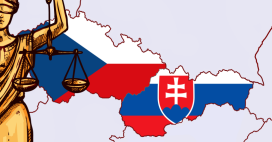
New research points to institutional racism against Roma in North Macedonia’s criminal justice system
New research published today by the European Roma Rights Centre (ERRC) reveals a multitude of human rights violations faced by Roma in the criminal justice system of North Macedonia. The report, Justice Denied: Roma in the Criminal Justice System of North Macedonia, was produced in partnership with Fair Trials.
“What we see in general society is mirrored in the institutions as well” said the ERRC’s President, Đorđe Jovanović. “It is not just a matter of racist police officers, racist prosecutors, or racist judges – it is an entire justice system that needs major reform in order to deliver anti-racist justice and eliminate this culture of antigypsyism that exists in criminal justice institutions.”
The research demonstrates that antigypsyism is not only pervasive in North Macedonia, but that it is engrained and routinised in the country’s criminal justice system. Romani defendants face discrimination at every stage of criminal proceedings from the police to the judges, prosecutors, and even their own lawyers. Once in prison, Roma also reported discrimination, racist violence, and even deaths of family members held in custody. The evidence from the research as well as the ERRC’s caseload over 25 years clearly demonstrates that law enforcement agencies are institutionally racist, and there is official tolerance of a culture of impunity within criminal justice institutions when it comes to mistreatment of Roma.
Fair Trials’ UK & International Legal Director, Bruno Min, said “Anti-Roma racism in criminal justice systems is a reality that governments across Europe must confront. It cannot be dismissed as a matter of isolated incidents, or a ‘few bad apples’, but be viewed as a systemic challenge that damages communities and perpetuates false, prejudicial attitudes towards Romani people. We can only make progress if the police, the courts, the prosecution service, and the legal profession acknowledge both the scale of the challenge, and the need to make extensive, meaningful changes to address structural inequalities in the criminal justice system.”
Most Romani interviewees, police, judges, prosecutors, and defence lawyers interviewed considered Roma to be overrepresented in the North Macedonian criminal justice system. This is due to a combination of reasons which include persistent racial profiling and violent over-policing of Romani communities, social marginalisation and higher rates of poverty, lack of eligibility for alternatives to sentencing, and a presumption of guilt rooted in wider racist narratives that associate Romani people with crime. As one interviewee put it, Roma are presumed to be guilty, and described how if there is a theft in the neighbourhood, the police order Romani residents to report to the police station for questioning: “In the worst-case scenario, if you refuse to plead guilty during the interrogation process, then a police officer will force you to do so by slapping you in the face and beating you and you will end up in pre-trial detention.”
The new research was based on a series of interviews conducted between May – September 2020 with people of Romani origin and professionals working in the criminal justice system: police officers, prosecutors, defence lawyers, and judges. The interviewees were selected considering two main factors: experience with the criminal justice system, and a geographical spread to ensure different regions were covered.
Justice Denied: Roma in the criminal justice system of North Macedonia can be read here in English and Macedonian.
This press release is also available in Macedonian.


